Saver types: An evolutionary-adaptive approach
Saver types: An evolutionary-adaptive approach
Author(s): Gergely Varga, János VinczeSubject(s): Socio-Economic Research
Published by: Akadémiai Kiadó
Keywords: agent-based macro-model; bounded rationality; evolutionary learning; saving types
Summary/Abstract: We set up an agent-based macro-model that focuses on the consumption-saving decision. Agents do not maximize utility, but their behaviour features certain “rational” aspects of human choice based on the idea of ecological rationality. Three qualitatively different saving strategies are defined: 1, buffer stock saving (prudent and forward looking); 2, permanent income saving (forward looking without prudence); and 3, myopic saving (caring only about immediate consumption). It is found that prudent saving behaviour becomes prevalent when the selection pressure is very high, but an economy comprising only prudent households tends to accumulate capital in excess of what is implied by the Golden Rule. Lowering the intensity of evolutionary forces results in more diversity in saver types, and, somewhat puzzlingly, may be socially beneficial in some sense.
Journal: Society and Economy. In Central and Eastern Europe ǀ Journal of the Corvinus University of Budapest
- Issue Year: 41/2019
- Issue No: 2
- Page Range: 263-287
- Page Count: 25
- Language: English

